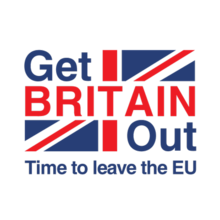|
Get Britain Out
Get Britain Out is a United Kingdom-based independent cross-party grassroots Eurosceptic group which campaigned for the United Kingdom to leave the European Union. The campaign is still in operation and is pushing for the UK to break away from continued alignment with the European Union. BackgroundThe EU Referendum Campaign Limited was registered in July 2012. Get Britain Out is a trading name of The EU Referendum Campaign Limited and was founded in 2010. Jayne Adye has been the director of Get Britain Out since its inception, and has been involved in the campaign since 2012.[1] The campaign's original aim was to push for an in/out referendum on Europe on the UK's membership of the EU.[2] 2016 EU referendumFollowing the announcement of an EU referendum to be held on 23 June 2016, Get Britain Out campaigned vigorously for a Leave vote, advocating for the UK to step away from the EU to pursue a future outside the European Single Market and the Customs Union, claiming that this would enable the UK to develop free trade deals with the rest of the world as well as exert greater control over immigration and security. During the referendum campaign, Get Britain Out regularly co-operated with other pro-Leave organisations to help build a coalition of Leave voices which could reach beyond the normal political bubble. After the referendumIn the immediate aftermath of the referendum, Get Britain Out called for Article 50 to be triggered immediately. However, after Prime Minister David Cameron resigned on the morning after the vote following his unsuccessful campaign for the UK to remain in the EU, the Conservative Party under subsequent leader Theresa May was fiercely divided over Brexit, and organisations such as Get Britain Out had significant frustration with the delays and compromises that took place during the 2017-2019 parliament. Since the 2016 referendum, Get Britain Out has campaigned on the UK diverging from EU policy, especially on foreign affairs. It regularly launches campaigns encouraging its supporters to contact senior politicians and representatives to influence the Government to push for a 'real Brexit'. Get Britain Out was vehemently opposed to Theresa May’s Withdrawal Agreement and lobbied MPs to vote against it consistently, arguing it did not resemble this 'real Brexit'. With no Withdrawal Agreement in place, Get Britain Out called for the UK to leave the EU on ‘no deal’ World Trade Organization terms, arguing any extension to the transition period would be going against the result of the referendum. Following the resignation of Theresa May in June 2019, the campaign backed Boris Johnson over Jeremy Hunt in the ensuing Conservative Party leadership election. Following Boris Johnson's proposed 2019 withdrawal agreement, Get Britain Out argued it was a "vast improvement" on that of Theresa May, but that there were still major flaws. 2019 general electionAs a cross-party campaign, Get Britain Out did not support any specific political party at the election. Instead, it recommended its supporters vote for any Leave-supporting candidate who stood the best chance of winning. Particular focus was placed on displacing pro-Remain MPs who represented seats where a majority of voters voted to leave the EU in 2016 - this included former Conservatives such as Dominic Grieve, Anna Soubry and Dr Philip Lee. Get Britain Out argued these MPs should not have been able to change parties or go directly against manifesto commitments without facing a by-election. Following the Conservatives' general election victory with a majority of 80 in December 2019, Get Britain Out publicly supported Boris Johnson's strong wording in favour of Brexit. The group also supported to Nigel Farage and the Brexit Party for the role they played in the election in co-operating electorally with the Conservative Party to minimise vote splitting amongst right-wing Leave voters. Future negotiationsGet Britain Out has pushed for a "hard-line approach" to future negotiations with the EU, arguing the UK should not enact political alignment with the EU. This includes, if necessary, triggering Article 16 of the Northern Ireland Protocol. See also
References
|
||||||||||||
